- Home
- David Gemmell
Drenai Saga 01 - Legend Page 16
Drenai Saga 01 - Legend Read online
Page 16
Elicas tugged at his small gold earring as Lebus the tracker outlined the skirmish. Elicas had never lost his fascination for the tracker’s skill. On a trail Lebus could tell one the sex of the horses, the age of the riders, and damned near the conversations around the camp fires. It was a science beyond his understanding.
“The old man entered the alley over there. The first man was hidden in the shadows. He struck him, and Druss fell. He rose fast. See the blood there? An ax cut across the thigh. Then he charged the other three, but he must have thrown his ax because he backed away to the wall there.”
“How did he manage to kill Mendar?” asked Hogun, who already knew from Druss. But he, too, appreciated Lebus’ skill.
“That had me puzzled, sir,” said the tracker. “But I think I have it. There was a fifth attacker who stayed back during the struggle. There is some indication that Druss and Mendar had ceased to fight and were standing close. The fifth man must have moved in then. See the heel mark there? That belongs to Druss. See the deep round imprint? I would say he swung Mendar around to block the fifth man.”
“Good work, Lebus,” said Hogun. “The men say you could track a bird in flight, and I believe them.”
Lebus bowed and moved away.
“I begin to believe Druss is everything they say he is,” said Elicas. “Astonishing!”
“True,” said Hogun, “but worrying. To have an army the size of Ulric’s opposing us is one thing; traitors at the Dros is quite another. And as for Mendar … it is almost beyond belief.”
“From a good family, I understand. I have put it around that Mendar aided Druss against Nadir infiltrators. It may work. Not everyone has Lebus’ talent, and anyway, the ground will be well trodden over by full daylight.”
“The Mendar story is a good one,” said Hogun. “But word will get out.”
“How is the old man?” asked Elicas.
“Ten stitches in his side and four in his head. He was asleep when I left. Calvar Syn says it’s a miracle the skull didn’t crack.”
“Will he still judge the open swords?” asked the younger man. Hogun merely raised an eyebrow. “Yes, I thought he would. That’s a shame.”
“Why?” asked Hogun.
“Well, if he hadn’t judged it, you would have done so. And then I would have missed the pleasure of beating you.”
“You conceited pup!” said Hogun, laughing. “The day has not yet come when you could breach my guard, even with a wooden sword.”
“There’s a first time for everything. And you’re not getting any younger, Hogun. Why, you must be over thirty. One foot in the grave!”
“We shall see. A side bet, perhaps?”
“A flagon of red?” said Elicas.
“Done, my lad! Nothing tastes sweeter than wine another man has paid for.”
“As I shall no doubt find out this evening,” retorted Elicas.
14
The marriage was a simple one, performed by the Abbot of Swords, Vintar, and witnessed by the captain and mate of the Wastrel. The sea was calm, the night sky cloudless. Overhead gulls wheeled and dived, a sure sign of approaching land.
Antaheim, one of the Thirty, tall and slender, his dark features showing his Vagrian descent, supplied the ring: an unadorned band of gold.
Now, as the dawn neared and the others slept, Rek stood alone at the prow, starlight glinting on his silver headband, wind streaming his hair like a dark banner.
The die was cast now. He was chained by his own hand to the Delnoch cause. Sea spray stung his eyes, and he stepped back, sitting down with his back to the rail and hugging his cloak tightly about him. All his life he had sought direction and an escape from fear, an end to trembling hands and an unsteady heart. Now his fears had vanished like candle wax before a flame.
Earl Regnak of Dros Delnoch, Warden of the North.
At first Virae had refused his offer, but ultimately, he knew, she would be forced to accept. If she had not married him, Abalayn would have sent a husband posthaste. It was inconceivable that Delnoch should lack a leader and equally inconceivable for a woman to take on the duties.
The captain had sprinkled their heads with seawater in the ritual blessing, but Vintar, a lover of truth, had omitted the blessing of fertility and replaced it with the more simple “Be happy, my children, now and until the end of your lives.”
Druss had escaped the attempt on his life, Gan Orrin had found his strength, and the Thirty were only two days from Dros Purdol and the last stage of their journey. The winds had been kind, and Wastrel was two, maybe three days ahead of schedule.
Rek studied the stars and remembered the sightless seer and his prophetic verse.
“The earl and the legend will be together at the wall, and men shall dream, and men shall die, but shall the fortress fall?”
In his mind’s eye Rek pictured Virae as she had been when he had left her almost an hour ago, her light hair tangled upon the pillow, her eyes closed, and her face peaceful in rest. He had wanted to touch her, to pull her close and feel her arms about him. Instead he had covered her gently with a blanket, dressed, and quietly climbed to the deck. Away to starboard he could hear the dolphins’ ghostly music.
Now he pulled himself upright and returned to his cabin. Once more Virae had kicked away the blanket. Rek undressed slowly and eased himself down beside her.
And this time he touched her.
Amidships, the leaders of the Thirty finished their prayers and broke bread together, which Vintar blessed. They ate in silence, breaking the bond of unity to enjoy their own thoughts. At last Serbitar leaned back and signaled the opening. Their minds blended together.
“The old man is a fearsome warrior,” said Menahem.
“But he is no strategist,” said Serbitar. “His method of holding the Dros will be to man the walls and do battle until a conclusion is reached.”
“There is little choice,” said Menahem. “We will offer no other option.”
“That is true. What I am saying is that Druss will merely pack the walls with men, which is not a serviceable idea. He has ten thousand men, and to defend efficiently he will be able to use only seven thousand at any given time. The other walls must be manned, essential services run, messengers assigned. There must also be a floating force ready to offer instant aid to any weak spot.
“Our strength must be to achieve maximum efficiency with total economy of effort. Withdrawals must be meticulously timed. Every officer must be not only aware but totally sure of his role.”
“And we must,” said Arbedark, “develop an aggressive attitude to defense. We have seen ourselves that Ulric is stripping whole forests in order to build his ballistae and siege towers. We must have inflammables, also containers for them.”
For over an hour, as the dawn breasted the eastern horizon, the leaders set about their plans: eliminating some ideas, refining and expanding others.
Finally Serbitar called on them to join hands. Arbedark, Menahem, and Vintar relaxed their control, drifting down into the darkness, as Serbitar drew their power to him.
“Druss! Druss!” he pulsed, his mind soaring across the ocean, past Dros Purdol, the port fortress, on along the Delnoch range past the Sathuli settlements, over the vast Sentran Plain—faster and faster he flew.
Druss awoke with a start, blue eyes scanning the room, nostrils flared to scent danger in the air. He shook his head. Someone was saying his name, but there was no sound. Swiftly he made the sign of the claw over his heart. Still someone called him.
Cold sweat appeared on his brow.
He reached across the bed, snatching Snaga from the chair by the wall.
“Listen to me, Druss,” pleaded the voice.
“Get out of my head, you whoreson!” bellowed the old man, rolling from the bed.
“I am of the Thirty. We are traveling to Dros Delnoch to aid you. Listen to me!”
“Get out of my head!”
Serbitar had no choice, for the pain was incredible. He released th
e old warrior and returned to the ship.
Druss staggered to his feet, fell, and rose again. The door opened, and Calvar Syn moved swiftly to him.
“I told you not to get up before noon,” he snapped.
“Voices,” said Druss. “Voices … inside my head!”
“Lie down. Now listen. You are the captain, and you expect men to obey you. That’s what discipline is about. I am the surgeon, and I expect to be obeyed by my patients. Now tell me about the voices.”
Druss laid his head on the pillow and closed his eyes. His head ached abominably, and his stomach was still queasy. “There was only one voice. It said my name. Then it said it was from the Thirty and that they were coming to aid us.”
“Is that all?”
“Yes. What is happening to me, Calvar? I’ve never had this before from a blow on the head.”
“It could be the blow; concussion can cause some very strange effects, including seeing visions and hearing voices. But they rarely last. Take my advice, Druss. The worst thing you can do at the moment is get overexcited. You could black out … or worse. Blows to the head can be fatal, even after a period of several days. I want you to rest and relax, and if the voice comes again, listen to it, even reply to it. But do not become alarmed. Understand?”
“Of course I understand,” said Druss. “I don’t normally panic, Doctor, but some things I do not like.”
“I know that, Druss. Do you need something to help you sleep now?”
“No. Wake me at noon. I have to judge a contest of swordsmanship. And don’t fret,” he said, seeing the gleam of annoyance in the surgeon’s one good eye. “I shall not get excited, and I will come straight back to bed afterward.”
Outside the room Hogun and Orrin waited. Calvar Syn joined them, signaled for silence, and beckoned them to a nearby office.
“I’m not happy,” he told them. “He’s hearing voices, and believe me, that is not a good sign. But he’s strong as a bull.”
“Is he in any danger?” asked Hogun.
“It’s hard to say. This morning I didn’t think so. But he has been under a lot of strain recently, and that may not help his condition. And although it is easy to forget, he is no longer a young man.”
“What about the voices?” said Orrin. “Could he go mad?”
“I think I would bet against that,” replied Calvar. “He said it was a message from the Thirty. Earl Delnar told me he had sent Virae to them with a message, and it could be that they have a speaker among them. Or it could be someone of Ulric’s; he also has speakers among his shamans. I have told Druss to relax and listen to any future voices and report them to me.”
“That one old man is vital to us,” said Orrin softly. “Do everything you can, Calvar. It would be a hammer blow to morale if anything happened to him.”
“Do you think I don’t know that?” snapped the surgeon.
The banquet to celebrate the open swords was a raucous affair. All who had reached the last hundred were invited; officers and enlisted men were seated side by side, swapping jests, tales, and tall, tall stories.
Gilad was seated between Bar Britan, who had beaten him soundly, and Dun Pinar, who had in turn vanquished Britan. The black-bearded Bar was cursing Pinar good-humoredly and complaining that the latter’s wooden sword lacked the balance of his own cavalry saber.
“I’m surprised you didn’t ask to be allowed to fight on horseback,” said Pinar.
“But I did,” protested Britan, “and they offered me the target pony.” The three men burst into laughter, which others joined as the joke spread around the table. The target pony was a saddle tied to a moving rail and pulled by ropes. It was used for archery practice and jousting.
As the wine flowed, Gilad relaxed. He had seriously considered missing the banquet, fearing that his background would leave him ill at ease with the officer class. He had agreed to come only when the men of his group had lobbied him, pointing out that he was the only member of Karnak who had reached the last hundred. Now he was glad he had been persuaded. Bar Britan was a dry, witty companion, while Pinar, despite his breeding—or perhaps because of it—made Gilad feel among friends.
At the far end of the table sat Druss, flanked by Hogun and Orrin, while beside them sat the archer leader from Skultik. Gilad knew nothing about the man, save that he had brought six hundred bowmen to the Dros.
Hogun, in full legion dress armor of silver breastplate edged with ebony and black and silver mail shirt, stared at the silver sword lying on the table before Druss.
The final had been watched by more than five thousand soldiers as Hogun and Orrin had taken their places. The first strike had been Hogun’s, a neat parry and riposte after a four-minute duel. The second had been Orrin’s, following a feint to the head. Hogun had blocked swiftly, but a subtle twist of the wrist had sent his opponent’s wooden blade down to touch Hogun’s side. After some twenty minutes Hogun led by two strikes to one, one strike from victory.
During the first break Druss strolled to where Hogun and his seconds sat drinking watered wine in the shade of Wall One.
“Nice work,” said Druss. “He’s good, though.”
“Yes,” said Hogun, wiping the sweat from his brow with a white towel. “But he is not as strong on the right.”
“True. But you are slow against the leg cut.”
“A lancer’s main fault. It comes from too much work in the saddle,” said Hogun. “He is shorter than I, which gives him an advantage in that respect.”
“True. It has done Orrin good to reach the final. His cheers outnumber yours, I think.”
“Yes, but that will not disturb me,” said Hogun.
“I hope it does not,” said Druss. “Still, nothing could be better for morale than seeing the fortress gan perform so well.” Hogun glanced up, holding Druss’s gaze, then the old warrior smiled and moved back to his judge’s seat.
“What was that about?” asked Elicas, walking behind Hogun and kneading the muscles of his neck and shoulder. “Encouraging words?”
“Yes,” said Hogun. “Do some work on the forearm, will you. The muscles are knotted there.”
The young general grunted as Elicas probed the flesh with his powerful thumbs. Was Druss asking him to lose? Surely not. And yet …
It would do no harm for Orrin to win the silver sword and would certainly increase his growing standing with the troops.
“What are you thinking?” asked Elicas.
“I’m thinking that he’s weak on the right.”
“You will take him, Hogun,” said the young officer. “Try that vicious parry-riposte you used on me.”
At two strikes even Hogun’s wooden blade snapped. Orrin stepped back, allowing a replacement, and offered his opponent a swift practice with the new weapon. Hogun was unhappy with the balance and changed the sword again. He needed time to think. Had Druss suggested that he lose?
“You’re not concentrating,” said Elicas sternly. “What’s the matter with you? The legion has a lot of wages tied up in this tourney.”
“I know.”
His mind cleared. No matter what the reason, he could not fight to lose.
He threw everything he could into the last attack, blocked a backhand sweep, and lunged. Just before his blade thudded against Orrin’s belly, however, the gan’s sword tapped his neck. Orrin had read the move and lured him in. In real combat both men would have died, but this was not real combat and Orrin had won. The two men shook hands as the cheering soldiers swarmed forward.
“That’s my money gone,” said Elicas. “Still, there is a bright side.”
“What’s that?” said Hogun, rubbing at his burning forearm.
“I cannot afford to settle our own bet. You will have to stand for the wine. It’s the least you can do, Hogun, after letting down the legion!”
The banquet lifted Hogun’s spirits, and the speeches from Bar Britan on behalf of the soldiers and Dun Pinar for the officers were witty and short; the food was good, the wine and
ale plentiful, and the camaraderie reassuring. It is hardly the same Dros, thought Hogun.
Outside at the portcullis gates Bregan stood sentry duty with a tall young cul from Group Fire. Bregan did not know his name and could not ask, since sentries were forbidden to talk on duty. A strange rule, thought Bregan, but there to be obeyed.
The night was chilly, but he barely noticed it. His thoughts were back in the village with Lotis and the children. Sybad had received a letter that day, and all was well. Legan, Bregan’s five-year-old son, was mentioned. It seemed that when he had climbed a tall elm and could not get down, he had cried and called for his father. Bregan had asked Sybad to write a few words for him in his next letter home. He had wanted him to say how much he loved and missed them all, but he could not bring himself to ask Sybad to pen such endearments. Instead, he asked him to tell Legan to be a good boy and obey his mother. Sybad took notes from all the villagers and spent the early evening composing the letter, which was sealed in wax and delivered to the mail room. A rider would carry it south with other letters and army dispatches for Drenan.
Lotis would have banked the fire by now and doused the lamps, Bregan thought. She would be lying in their rush-filled bed, probably asleep. Legan would be asleep beside her, he knew, for Lotis always found it difficult to sleep alone when Bregan was away.
“You will stop the savages, Daddy, won’t you?”
“Yes,” Bregan had told him. “But they probably won’t come. The politicians will sort it out, just like they have always done before.”
“Will you be home soon?”
“I’ll be back for harvest supper.”
“Promise?”
“I promise.”
The banquet over, Druss invited Orrin, Hogun, Elicas, and Bowman to the earl’s study above the great hall. The servant Arshin brought them wine, and Druss introduced the outlaw to the fortress leaders. Orrin shook hands coolly, his eyes showing his distaste. For two years he had sent patrols into Skultik with orders to catch and hang the outlaw leader. Hogun was less concerned with Bowman’s pedigree and more interested in the skills the outlaws could bring. Elicas had no preconceived opinion but instinctively liked the blond archer.

 Bloodstone
Bloodstone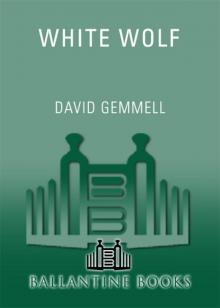 White Wolf
White Wolf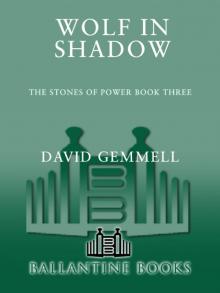 Wolf in Shadow
Wolf in Shadow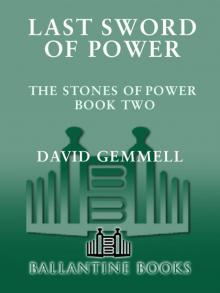 Last Sword of Power
Last Sword of Power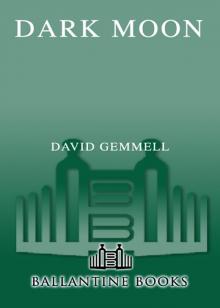 Dark Moon
Dark Moon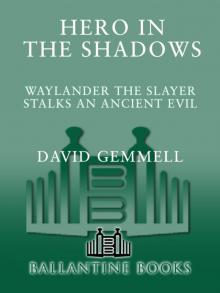 Hero in the Shadows
Hero in the Shadows Gemmell, David - Drenai 09 - Hero In The Shadows
Gemmell, David - Drenai 09 - Hero In The Shadows Waylander
Waylander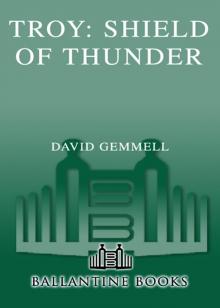 Shield of Thunder
Shield of Thunder Stormrider Stormrider
Stormrider Stormrider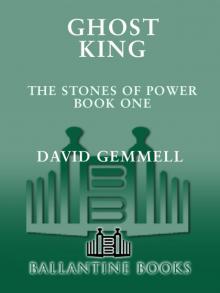 Ghost King
Ghost King Legend
Legend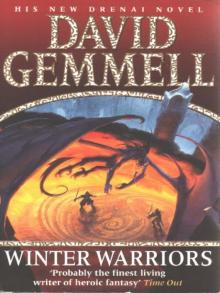 Winter Warriors
Winter Warriors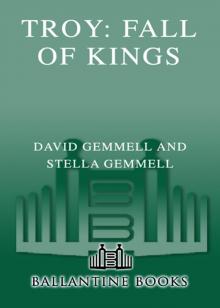 Fall of Kings
Fall of Kings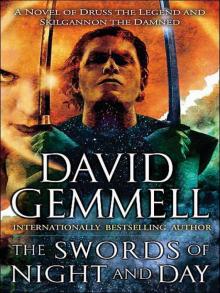 The Swords of Night and Day
The Swords of Night and Day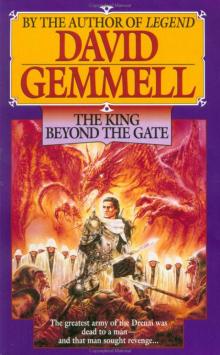 The King Beyond the Gate
The King Beyond the Gate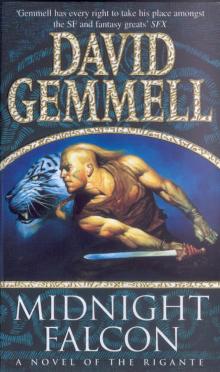 Midnight Falcon
Midnight Falcon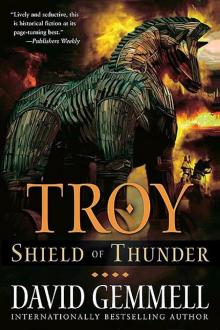 02 - Shield of Thunder
02 - Shield of Thunder In the Realm of the Wolf
In the Realm of the Wolf Ravenheart
Ravenheart The First Chronicles of Druss the Legend
The First Chronicles of Druss the Legend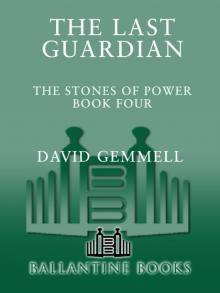 Last Guardian
Last Guardian Stormrider
Stormrider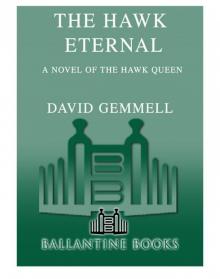 The Hawk Eternal
The Hawk Eternal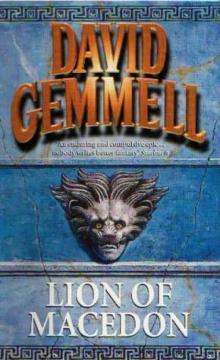 Lion of Macedon
Lion of Macedon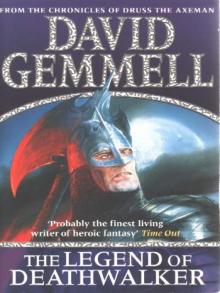 The Legend of Deathwalker
The Legend of Deathwalker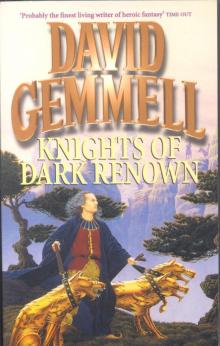 Knights of Dark Renown
Knights of Dark Renown Echoes of the Great Song
Echoes of the Great Song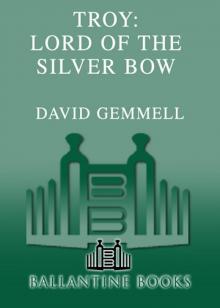 Lord of the Silver Bow
Lord of the Silver Bow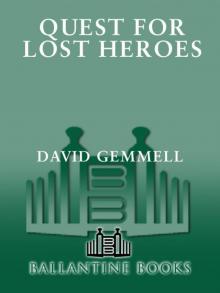 Quest for Lost Heroes
Quest for Lost Heroes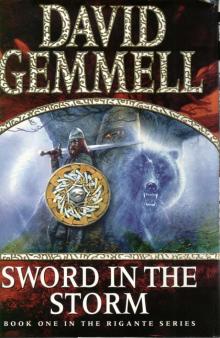 Sword in the Storm
Sword in the Storm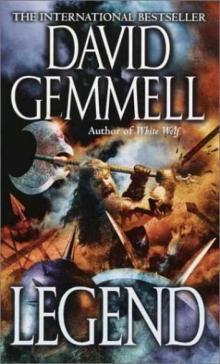 Drenai Saga 01 - Legend
Drenai Saga 01 - Legend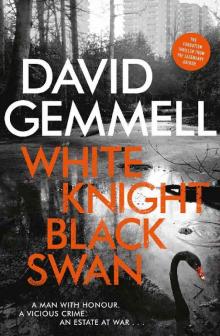 White Knight/Black Swan
White Knight/Black Swan![[Troy 02] - Shield of Thunder Read online](http://i1.bookreadfree.com/i/03/19/troy_02_-_shield_of_thunder_preview.jpg) [Troy 02] - Shield of Thunder
[Troy 02] - Shield of Thunder Lord of the Silver Bow t-1
Lord of the Silver Bow t-1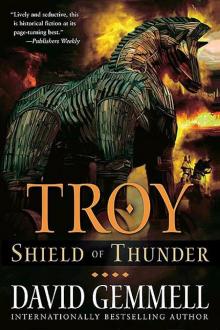 Shield of Thunder t-2
Shield of Thunder t-2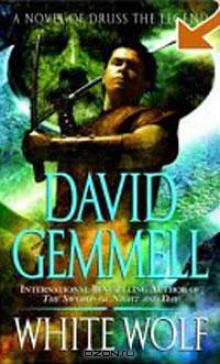 White Wolf: A Novel of Druss the Legend dt-10
White Wolf: A Novel of Druss the Legend dt-10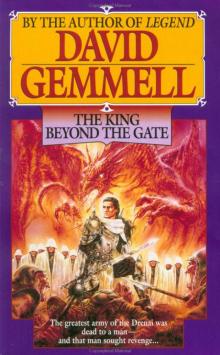 Drenai Saga 02 - The King Beyond the Gate
Drenai Saga 02 - The King Beyond the Gate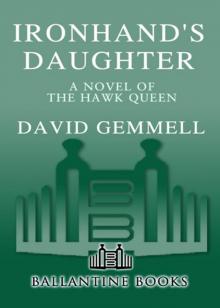 Ironhand's Daughter
Ironhand's Daughter Gemmell, David - Drenai 06 - The First Chronicles of Druss the Legend
Gemmell, David - Drenai 06 - The First Chronicles of Druss the Legend The Last Guardian
The Last Guardian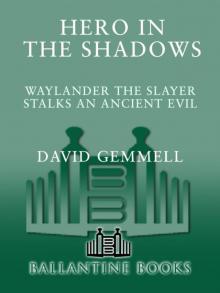 Hero in the Shadows: A Waylander the Slayer Novel
Hero in the Shadows: A Waylander the Slayer Novel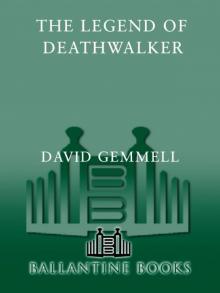 The Legend of the Deathwalker
The Legend of the Deathwalker